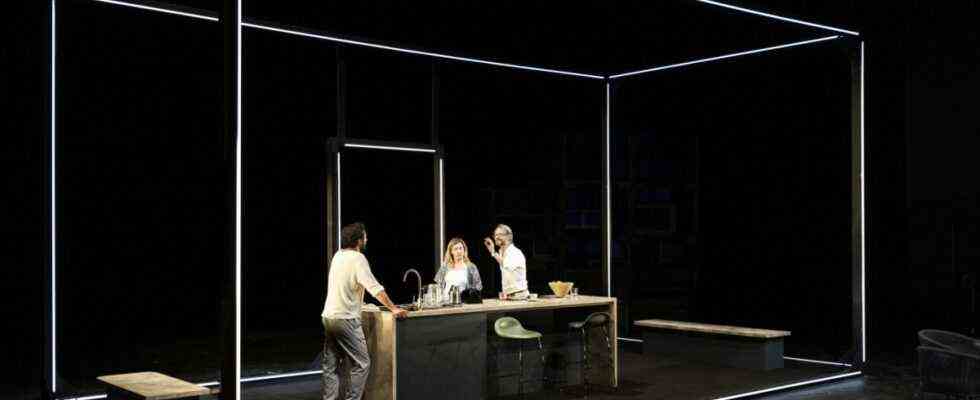The myth is still hot and unshakable, whoever is struck by its spell will suffer forever. We are talking about “King Oedipus”, the drama of Sophocles, almost 2500 years old and yet something like the piece of the hour. The plague appears in it and the self-knowledge of the title hero, who has been struck with blindness and who gradually realizes that he himself is the perpetrator he is looking for, the murderer of his father, the husband of his own mother, the patron saint of all those struck by fate. After the piece was recently released in Berlin at the Deutsches Theater and in musical-theatrical versions at the Komische and the Deutsche Oper, there is now “Oedipus” at the Schaubühne: in a transmission by Maja Zade today, the title written with a lowercase ö – ö like “dreary”, and unfortunately that’s it.
Maja Zade has been the Schaubühnen dramaturge for twenty years. She has been writing pieces herself for a few years. Pieces in which she listens to realistic dialogues from the gluten-free, affluent generation of heirs, the Thirty- and Forty-Somethings, which can be found in abundance in Berlin-Mitte. In “Abgrund” (2019) that went well as a well-made-play theater with an abruptly bursting Manufactum bubble – while three couples are chatting in the designer kitchen, a child dies next door – directed by Thomas Ostermeier. The Schaubühnen boss has now personally directed “Oedipus”, and again he is placing the staff around a noble kitchen island as if around an altar in a black void (stage: Jan Pappelbaum). The room is framed three-dimensionally by neon tubes, which reinforce the cold surface shine and looks like it has been computer-generated. Sand on the floor, a grill, a table, and garden chairs to the right of the box. We are in Greece. Vacation. Villa. Video landscapes. Time for fish with cucumber salad and existential discoveries. The whole truth comes to the designer table. If it were made of wood, the beams would bend due to the load of stereotypes.
The focus is on Caroline Peters as a widow and chemical manufacturer – “yesterday a housewife, today boss”
The focus is not so much on Oedipus with a small ö – his name is Michael (Renato Schuch) and is not only the ecologically conscious consultant, but also the curly, attractive lover of Christina (Caroline Peters), the boss of a chemicals company. Rather, the focus is on her, this Christina (with Sophocles: Iokaste), “yesterday a housewife, today boss”, as her caustic brother Robert (Christian Tschirner) unkt in all misogyny. After the accidental death of her hated husband Wolfgang, she took over the company and started something with the much younger Michael, from whom she is now pregnant. Uh!
Since it’s about the Oedipus myth, one certainly doesn’t spoil too much if it is revealed here that this is Michael Christina’s son, whom she had her confidante Theresa (Isabelle Redfern) put in the baby hatch as a newborn. And that it was Michael who, willy-nilly, caused the accident in which Wolfgang, i.e. his father, died in a truck loaded with pesticides. And that the chemicals that ended up in the groundwater as a result, leading to breathing difficulties in children and possibly increased cancer incidence, are ultimately his responsibility. Where he himself has commissioned a soil investigation in the sense of a new corporate culture (“against encrusted and corrupt structures”), a man of clarification and transparency! You can often see his face filmed live in close-up.
The old story in new canisters. The acute fluidity of the topics in the text, full of clichés and squeaky constructions – and not filtered by the high-gloss, realistic television control room, but rather exhibited – smells to the sky. And when the circumstances are unraveled, it seeps so tenaciously into the bottom of the facts that even an exceptional actress like Caroline Peters can’t tear anything that evening. The marital rape of which she reports leaves one as cold as the adoptive parents’ sadness described by Michael, yes, even his truth-finding. There is no being in this theater design. As always, the audience reacted on the opening days of the season: Happy to be able to go back to the theater at all.

